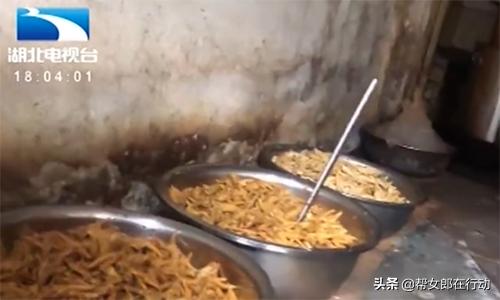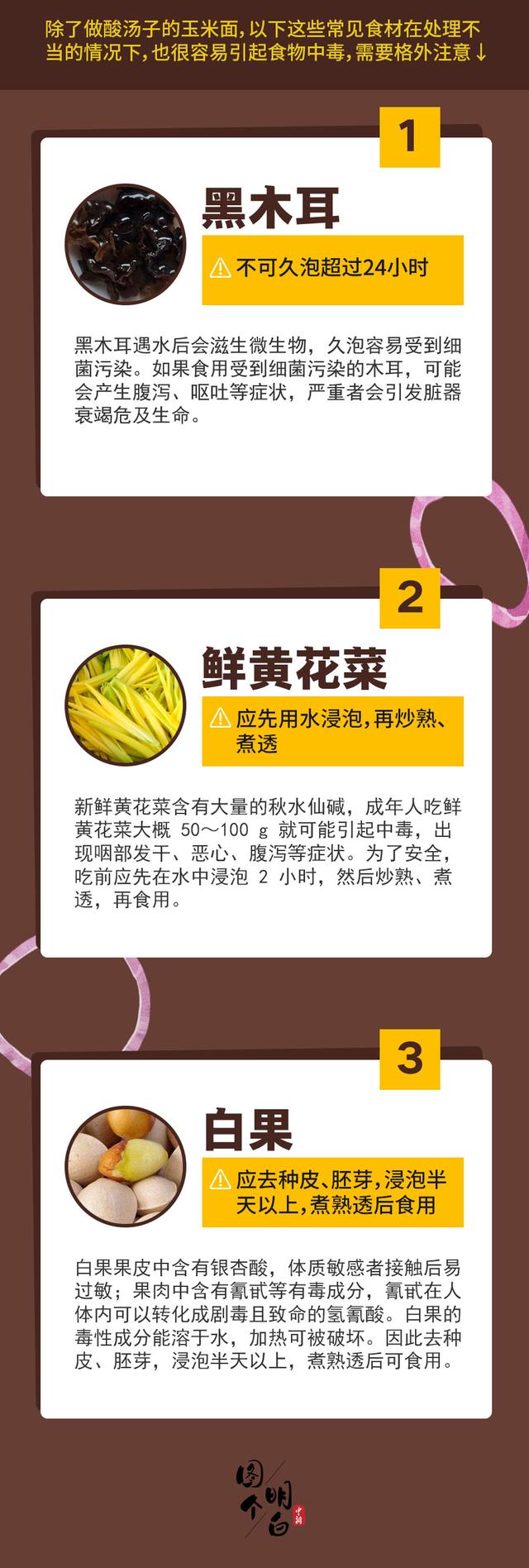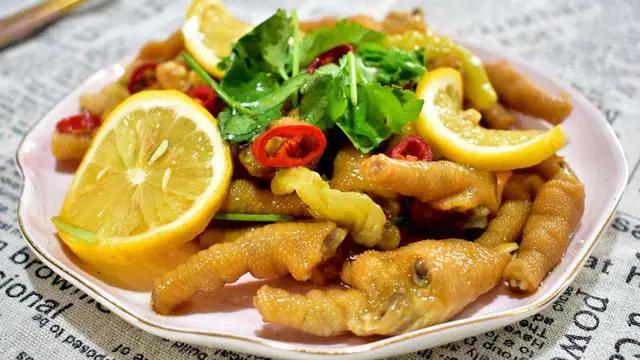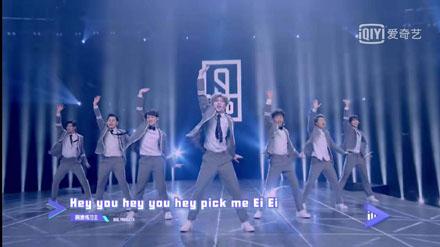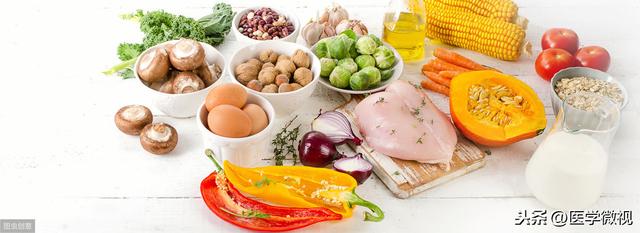最美的乡村印象(孙振华新时代新桃源)
重庆酉阳桃花源景区有一句著名广告语:“世界上有两个桃花源,一个在您心中,一个在重庆酉阳”。作为景区的“桃花源”,是一个物质地域的存在,去,还是不去,它都在那里。而心中的桃花源,则是一个想象性的审美存在,不同时代,不同空间,人们都赋予了它以不同的想象,寄寓了不同的希望,承载了各种可能。在这个意义上,“桃花源”如同一个寻梦空间,是一个可以永久填充的话题。人类能够走多远,关于“桃花源”的审美想象就可以延伸有多远。
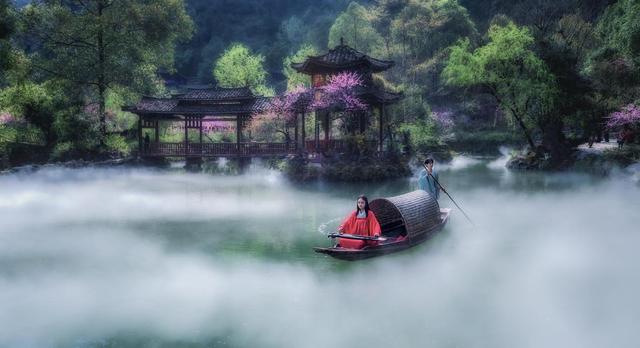
中国酉阳乡村艺术季是重庆酉阳从2019年开始启动的一个为时三年的项目,它将依据时间先后,在叠石花谷、菖蒲花田、红花村三个地方分别展开。酉阳乡村艺术季一方面它以推动酉阳文旅发展为契机,另一方面,它是在原有酉阳“桃花源”景区的基础上,通过乡村艺术,探索、发现、重建新时代的乡村美学。

在目前名目繁多的艺术乡建,艺术介入乡村的活动中,酉阳乡村艺术季如何通过自身的实践,寻找到一条具有文化传承,具有地域特色,具有当代创新的乡村美学之路?什么又是今天所需要的乡村美学呢?这正是乡村艺术的酉阳实践所要面对和解决的问题。
一、二十一世纪乡村美学是当代的美学;其基础是要为中国传统乡村美学注入现、当代元素,它是在新的美学基点上构建新时代的“桃花源”。
陶渊明笔下的“桃花源”以及他的田园诗所传达出来的审美趣味,构成了中国传统乡村美学的核心,它表达了返璞归真,心随自然,抱守淡泊,追求心灵的自由和解放的审美理想。进入二十世纪,中国传统乡村社会的稳定结构被打破,随着现代化的转型,中国文化的主场开始由乡村转向城市,传统的乡村美学很多时候只能作为心灵的慰藉而存在,或者作为对现代城市的批判的武器存在,事实上,传统的乡村是再也回不去了,传统的乡村美学也失去了它的现实基础。然而,城市化的进程,工业文明的崛起并不能以牺牲乡村为代价,在城乡二元对立日益严重的今天,重建乡村美学成为新时代中国的重要共识。
重建新时代乡村美学不是为了复古,也不是为了怀旧,而是以开放、包容、进取的心态,面对当代文化的发展,在传统乡村美学的基础上,进行新的创造,创造出与时代同行的当代乡村美学。纵览2019中国酉阳乡村艺术季第一期的17件作品,它们从不同侧面,证实了这种新的乡村美学的兴起。
艺术家焦兴涛在叠石花谷用总长35米的木材,堆出了一个数字柴堆,名为《13896152193》,这是作者真实的电话号码,艺术季开幕后,作者将用这个手机接听每一个愿意打进电话的人,和他们对话、互动,回答他们任何感兴趣的问题。

在酉阳乡村,劈柴是农户的必备之物,围火塘而坐,是当地最典型的乡居生活的场景。另一方面,手机通讯的出现,它在乡村运用之广,极大地改变了乡居生活在信息沟通和传播的局限。这件装置作品,用传统媒介,表达了最当代的现实,让质朴的乡居生活具有了当代气息。
赵明的《日常景园》,来自作者在现场对农户家居的观察,发现各家各户都有自己的园林景观,她将这些元素集中,采用3D打印的方式,制作成了装置作品。赵明的这种努力既是旧物的发掘,又是新的转化、提升、再造。
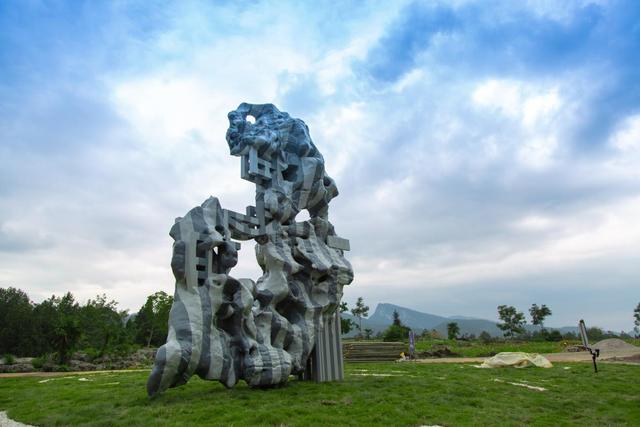
洛鹏的作品来自最常见的乡村建筑——风雨桥,和赵明一样,他也对传统进行了大胆地转换,用不锈钢管加循环水机械系统制作了一座“水印风雨桥”,它为村民和参观者提供了一种完全不同的穿行体验,这种对传统乡村元素的利用和重新创造,让乡居生活和当代世界产生了关联。
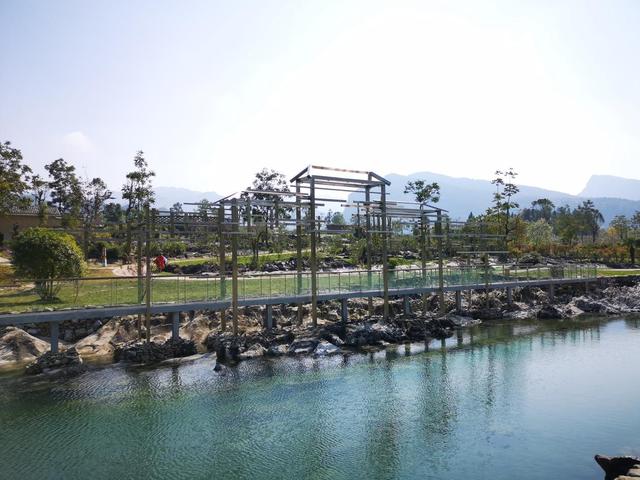
艺术家幸鑫用庄稼的秸秆制作成了“火车”,将农业文明和工业文明做了巧妙地嫁接,展现了社会发展变化的现实,它在田间的展示收到了很好的效果,

从以上列举出的作品可以看出,新的乡村美学不再是陶渊明式的“暖暖远人村,依依墟里烟”,它们是乡村的,但是又是当代的;它们是怀旧的,但又反射出时代的痕迹和变化,反映了当代人对于近日乡村的新的审美感受和体验。
二、二十一世纪的乡村美学是参与的美学;它改变过去审美创造者决定、影响、教化接受者的那种简单的线性关系,确立乡民作为参与者在审美活动中的主体地位,艺术家和只有和参与者合作和互动,才能建立新时代乡村美学的审美关系。
重建当代乡村美学,要反映出当代艺术和审美文化的新趋势,目前而言,参与、互动是当代艺术和美学的重要趋势。因此,对酉阳乡村艺术季而言,它首先要求艺术家做乡村的建设者,做农民的合作者,这将改变了过去人们习惯了的创造者和接受者之间的关系,乡民作为参与者和其他艺术接受者一样,也是艺术的主人;乡村艺术是艺术家和参与者共建的,他们共为主体,共同合作,共同创造。
在本季作品中,出现了一些强调互动、参与的作品。焦兴涛的《13896152193》就是一件典型的互动作品;刘佳的《悄悄话》也是用娱乐化的方式,将“悄悄话”、“倾述”、“倾听”这些涉及到交流、对话的问题突显出来,达到互动的目的。

武小川的《九曲十八道之镜墙》创造出一个十分富于人文内涵的互动景观,他使用的材料除了石头,还有植物,枯树,镜面不锈钢。这件作品借鉴了民间“转九曲”的习俗,将其审美化和景观化,构造了一个类似广场的参与式空间。对观众而言,这是一个奇妙的旅程,它不只是按作者所指引的九曲十八弯的路径行走,更重要的这是一个感受和体验时间过程,也是空间过程。参与者与作品和作品的“镜墙”之间,形成了互为关照的丰富关系,它们有虚实关系,看与被看的关系,除非身在其中,否则无法领略作品趣味所在。
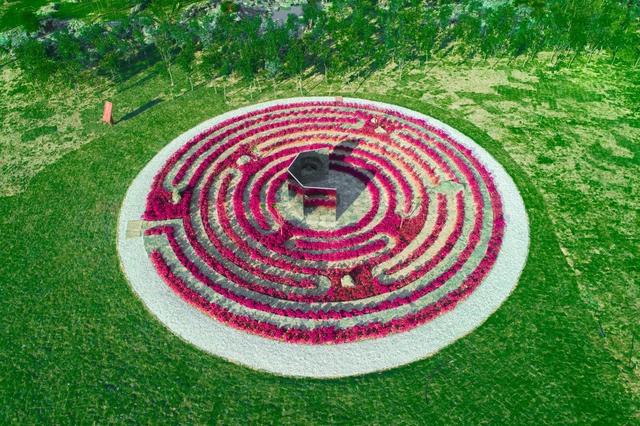
张超的《流年》用夯土墙、弹力装置、竹子、喇叭、旧农具熔炼的铁块组成的一个构筑物,这也是一件身体参与的作品。这件作品既并不具体呈现某个传统物象,也不是明确表达某种当代意图;它更像是一个用人们熟知的各种物件所构建出来的,容纳人的身体体验的容器,它新奇、神秘,在里面可以体验到时间的流逝,空间的异样,声音的神奇。
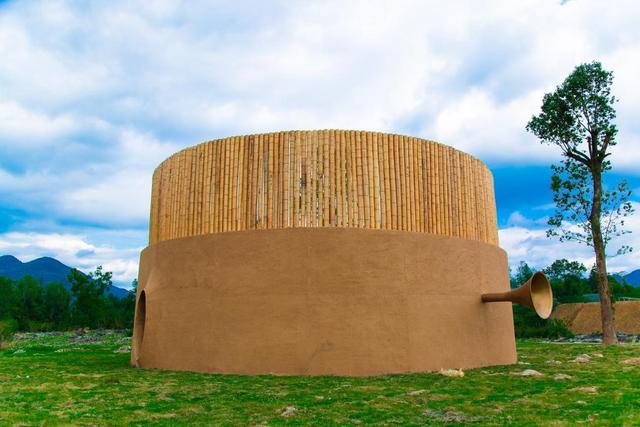
这些强调互动的作品改变了“我做你看”;“我教化,你接受”的传统模式,将接受者的主动性放到了非常重要的位置上,最后导致的结果只能是,作品只能让创作者和接受者共同完成,这种参与和互动方式所反映出的,是乡村美学的嬗变。
三、二十一世纪乡村美学是在地的美学,它尊重和保护乡村的多样性和独特个性,因此,它要最大限度地尊重地方,强调在地性,发掘当地的文化资源、自然资源、材料资源,尊重当地的乡风民俗,尊重当地的生产生活习惯。
新的乡村美学的在地性表现在,其一,突出地方资源,对艺术季的作品而言,应突出酉阳的历史资源、文化资源、自然资源;其二,照顾地方的需要,作品应该围绕酉阳的实际需要,地方的问题,进行有针对性的创作;其三,尽量使用地方材料,即当地出产,为当地人所熟悉的材料,如石、木、竹、稻草、植物、花卉、水面、废弃的农用工具、物件等等,以突出地方特色。
斗笠是农村最常见的一种遮阳避雨的工具,傅中望的《斗笠》就是具有非常浓郁乡村气息的作品,作者为现场的枯树带上特意编制的竹编大斗笠,放大、突出了普通的乡村日常物品,又让枯死的树木,以另一种方式存在。
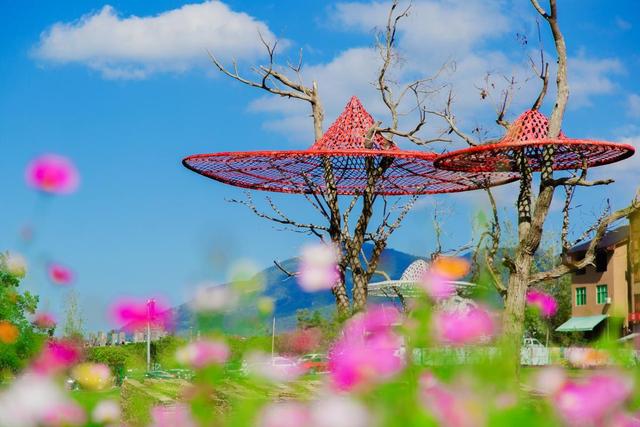
李娜的作品《宝 · 物》也是突出地方性的,她将建筑造型和博古架的功能结合起来,用方形镀锌管和旧农具搭建了一个大门,为让乡村的普通和寻常具有了纪念碑的意义。
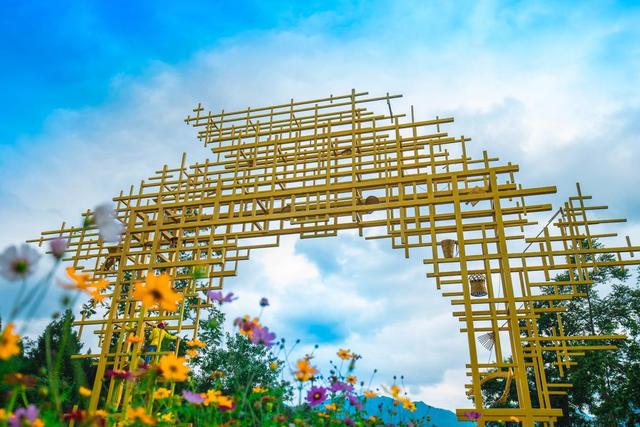
本次乡村艺术季的作品中,有几位作者由于对当地环境的深入考察,针对具体的地貌和环境,创作出了他们深度地锲入环境的作品,收到了很好的效果。曹晖《千秋雪》用汉白玉,在黑色的石头上营造出一片“冬日残雪”的景观,这些新增的汉白玉石头形态各异,表现雪和融雪的姿态,让原本平凡无奇的山石地面,平添出一种神奇,产生出让人惊赞的视觉效果,改变该地貌比较单一的景观状态。
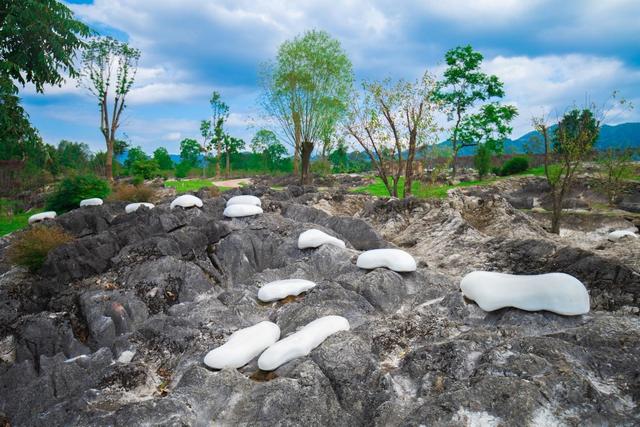
张翔的《星图》也是针对同样的地面,他将大量的白色圆形石球放置在天然黑色石阵之中,形成抽象的圆形和随机自然的石头形状的鲜明对比,形成了新的景观面貌。
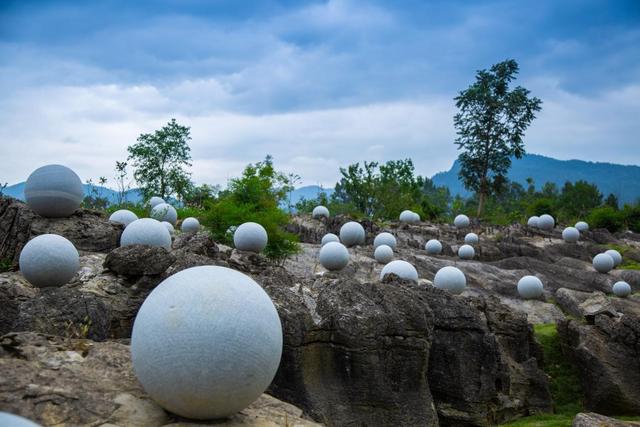
本次艺术季的作品有一个要求,所有作品方案全部都是在现场考察的基础上,针对环境,针对地域特点来进行创作的。由于坚持在地化,突出地方资源,所以,这些作品就像是从当地生长出来的一样,而不是把艺术家的个人作品从工作室、从展厅简单地复制、搬运过来的。
四、二十一世纪乡村美学是生态的美学,它要求最大限度地尊重自然,保护、恢复乡村的生态环境,以一种顺应自然而不是改造自然的方式进行创作。创作中保持对大自然的敬畏之心,在材料选择上,尽量选取绿色环保的材料,可循环再生的材料,废弃的材料等等,践行环保、低碳、可持续发展的理念。
从历史上,传统乡村美学中所包含的那种和大自然温馨、和谐的关系,是它最有魅力的地方。如何以绿色、生态的方式,重建乡村美学,在本次酉阳乡村艺术季中也进行了相关的尝试。
陈杨的《里面的世界,外面的世界》采用竹编加球面镜作为材料,创作出一个相对独立的空间,它既可以由外入内,也可以由内看外,它以人们习以为常的竹子作为材料,除了它的自然属性之外,竹子对中国人而言,还有一种特殊的文化的联系,竹子天生地让人感到亲切、自然、安逸,人和竹子的这种亲近感显然是由竹子本身的历史和文化书写所决定的。

单丞的《农卷风》在竹编圈体中编入农家的日常器具,显得别出新意。竹子这种材料虽然算不上永久性的材料,但正因为它不是永久的,所以具有可再生、可降解的特点,它不会影响和破坏自然资源,属于典型的生态材料,所以本次艺术季,竹子材料特别多。
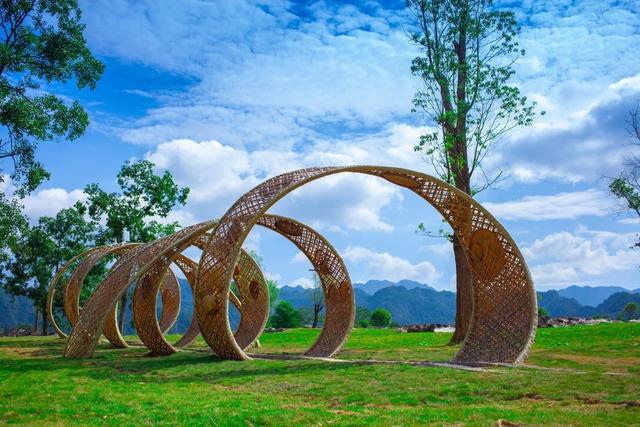
《漂浮的树》是生态美学的另一种思路,即化腐朽为神奇,对废弃的再利用,使之变废为宝。陈扬用镜面不锈钢包裹住树干的底部,让它产生反射效果,成为一景,也让这株死去的树重新获得生命。

李浏洋的作品也是利用枯树做文章,他的《不愿离去》为枯树安装造雾、滴灌系统,环绕枯树,造成雨雾效果,让枯树物尽其用,变得诗意盎然。
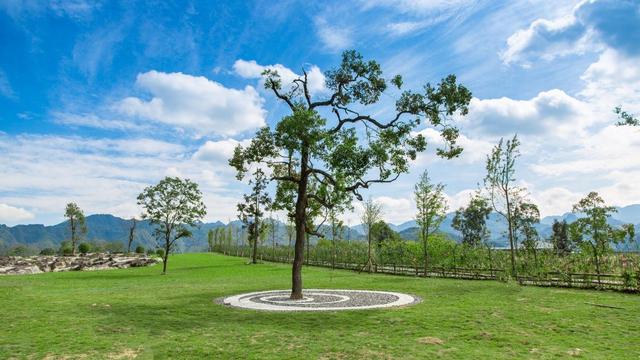
五、二十一世纪乡村美学是生活的美学;它倡导乡村艺术的生活化和功能化,在艺术介入乡村的过程中,融入乡村日常生活,在满足审美功能的同时,帮农民解决实际问题,用艺术的方式促进乡村环境卫生和居住条件的改善,让乡村艺术真正成为乡民所需要的艺术。
本次酉阳乡村艺术季,强调去精英化,做农民看得懂的艺术;同时也强调功能化:希望这些作品本身就帮农民解决实际问题,能融入乡民的生活,帮到乡民,例如营造乡村公共设施和公共家具,修桥铺路、美化墙壁、促进环境卫生、改善居住生活条件等等。总之,新的乡村美学不是去功能化的精英美学,相反,它提倡创作有实际功能的乡村艺术,让艺术紧紧和生活融为一体。
从实际创作出的作品看,响应这一号召的作品似乎并不多。这在很大程度上,恐怕还是与大家对什么是乡村艺术的理解有关,或许,大家还是习惯地认为,作品总归应该是个独立的存在。事实上,乡村艺术完全可以与具有实用功能的器物、造型、空间结合在一起;它可以和实用品的装饰结合在一起;就像古代的青铜器、陶器、家具一样。
当然,这有些作品露出了苗头。刘佳的《叠石露天剧场》具有公共空间休憩的功能,它为人们提供了一个小憩、休闲之处。这里的石头座椅打磨成舒服的“懒人沙发”,既有实用功能,又是艺术作品。
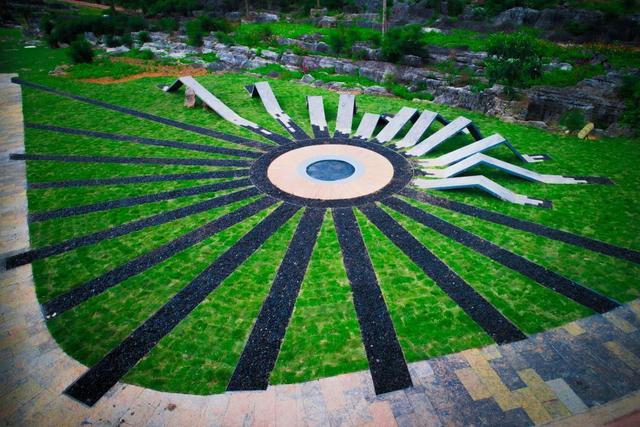
冯杨的《位置》部分地改变了农村条凳的功能,又部分地保留了它的功能。这件装置作品让人亲切,又很巧妙。这些条凳除了是抽象的装置作品,还可以让人坐,还可以供小朋友玩耍、攀爬,好看、好用。

乡村振兴离不开乡村美学。这在于乡村不光是一个地理空间的存在,它还是一个美的存在,是一个意义的存在。乡村除了生产乡愁,生产记忆,在今天,它还能生产新的价值和意义;因此,乡村振兴的过程,也是新乡村美学的生成过程。
重庆酉阳之所以通过艺术季的形式,进行乡村艺术活动,就是希望通过自己持续的努力,为重建中国的乡村美学尽一份力量。当然,仅仅就目前的规模而言,这些力量也许是微薄的,然而,让人信心满怀的是,酉阳的所作所为正好踩在了时代的节拍上。
New Era • New Land of Peach Garden
----Practice of Rural Aesthetics in 21st Century in Youyang
Sun Zhenhua
A famous slogan of the Land of Peach Garden in Chongqing Youyang says:” Two Lands of Peach Garden in the world, one is in your heart while the other is in Youyang, Chongqing.”
As a scenic spot, the Land of Peach Garden exists as a substantial region. To go ther or not, it is there. While the Land of Peach Garden in heart is an imaginative aesthetic existence. In different eras and spaces, it is endowed with different imaginations and hopes by humans, thus, it always carries various possibilities.
In this sense, the “Land of Peach Garden” is like a dream-seeking space, a topic that could be permanently refilled with. The aesthetic imagination about the “Land of Peach Garden” could be extended as long as human beings could exist.
China Youyang Rural Art Festival is a 3-year project of Youyang, Chongqing starting from 2019. Stromatolite Stones Flowers Valley, Calamus Field and Red Flower Village will blossom at 3 regions chronologically. On one hand, the Festival takes the opportunity to promote the development of culture and tourism in Youyang, on the other hand, it explores, discovers and rebuilds the rural aesthetics of new era on the basis of the current “Land of Peach Garden” scenic area.
In various art construction in rural areas whereas art is involved in rural activities, how could Youyang Rural Art Festival find a way of rural aesthetics with cultural heritage, regional characteristics and contemporary innovation through its own practice? What is the needed rural aesthetics today? This is the problem that the practice of rural art in Youyang has to face and solve.
1. The 21st Century rural aesthetics is a contemporary aesthetics based on the injection of contemporary elements to Chinese traditional rural aesthetics. It is the “Land of Peach Garden” of new era based on new aesthetics.
The aesthetics taste conveyed by Tao Yuanming’s “Land of Peach Garden” and his idyllic
poetries constitute the core of traditional rural aesthetics in China. It expresses the aesthetics ideals of returning to nature, heart being with nature, being indifferent with fame and wealth, pursuing freedom and liberation.
The stable structure of the Chinese traditional rural society has been broken when entering the 20th Century. Along with the transformation of modernization, home to Chinese culture shifts from rural areas to urban areas, whereas the traditional rural aesthetics could exist like a comfort to souls or like a weapon of criticism to modern cities. Actually, we can never return to the traditional rural areas, the traditional rural aesthetics also lost its realistic foundation.
However, the process of urbanization and the rise of industrial civilization cannot be at the expense of rural areas. In the current time of the increasingly serious urban-rural opposition, the rebuilding of rural aesthetics has become an important consensus in the new era of China.
Rebuilding rural aesthetics of the new era is not for returning to the ancient times or for nostalgia. On the contrary, it needs an open, comprehensive and enterprising attitude to face the development of contemporary culture, creating contemporary aesthetic synchronizing with times.
Having a survey of the 17 artworks of the 1st Phase of 2019 China Youyang Rural Festival, we could confirm from different perspectives that new rural aesthetics will rise.
In the scenic spot of Stromatolite Stones Flowers Valley, by using 35-meter long timbers, artist Jiao Xingtao has made a figure-shaped wooden pile named “13896152193”. It’s the creator’s real cell phone number. The creator is willing to answer every incoming phone call, interacting with them and answering any questions that they are interested in.
In rural areas of Youyang, Firewood is essential to every peasant household, sitting around the fire pit is the most typical scene of local rural life. On the other hand, the emergence of cell phone has greatly broken the limitations of rural life in information communication and transmission since it has been widely used. By using traditional medium, this artwork has expressed the contemporary reality, filling the simple rural life with contemporary atmosphere.
“Daily Garden Landscape” from artist Zhao Ming comes from the observation of the creator to the life of peasant household. The creator has found each household has its own landscape. By using 3D printing, Mrs. Zhao assembles these elements to create an artwork of “ Daily Garden Landscape”. Her efforts are not only the excavation of old things, but also new transformation, promotion and reconstruction.
The artwork of Luo Peng comes from the most usual rural construction – the Wind-Rain Bridge. Like Zhaoming, he boldly changes the traditions by using stainless steel tube circulating water mechanic system to create a “Watermark Wind-Rain Bridge”. It provides the villagers and visitors with a completely different crossing experience. The use and re-creation of traditional rural elements has created a connection between rural life and contemporary world.
Artist Xing Xin creates a “Train” made of straws of crops. It skillfully connected with agricultural and industrial civilization and shows the reality of social development. Its display in the field has received good effects.
As can be seen in the artworks listed above, the new rural aesthetics will be no longer like in Tao Yuanming’s verse“ Remote villages can be vaguely seen, chimney smokes rising in the air”. It is not only rural, but also contemporary, it is not only nostalgic, but also reflects the traces and changes of eras, reflecting the feelings and experiences of new rural aesthetics of contemporary people.
2. The rural aesthetics in 21st Century is the aesthetics of participation. It has changed the relationship that the aesthetics creators influence, dominate and civilize the embracers. It also establishes the dominate role of villagers as participants in the aesthetics activities. Only by interacting with participants can the artists establish the aesthetic relationship of new era rural aesthetics.
It’s crucial to reflect new trend of contemporary artistic and aesthetics culture if to rebuild contemporary rural aesthetics. Currently, participation and interaction is crucial to contemporary art and aesthetics. Youyang Rural Art Festival will require artists to be the village builders and peasants’ collaborators. This will change the relationship between creators and embracers that people have been gotten used to. Like participants and other art embracers, villagers are also the masters of arts. Rural art is jointly built by both artists and participants. They are both the principal parts of rural arts. They work together, create together.
Some artworks emphasize on participation and interaction appear in this festival. The artwork of “13896152193” created by Jiao Xingtao is a typical artwork of this kind. The “Pillow Talk” of Liu Jia also highlights “whispering, telling and listening” by way of entertainment to achieve interaction.
“Mirror Wall of Nine Bends and Eighteen Paths” made by Wu Xiaochuan has created an interactive landscape abundant in humanistic connotation. Apart from stones, it is made of plants, decayed trees and mirror-finished stainless steel, building up a participatory space. It is not just the nine bends and eighteen paths directed by the creator, more importantly, it is a wonderful journey, a process of experiencing and feeling time as well as the spatial process. A rich relationship of mutual cares has been formed among the participants, artworks and the “mirror wall” of the artwork. Virtual or real, seeing or be seen. You cannot enjoy the taste of the artwork unless you are in middle of it.
“Bygones” of Zhang Chao is also an artwork of physical participation, composed of loam wall, elastic devices, bamboos, horns and iron blocks smelted by old farm tools. It neither specifically presents a traditional object, nor does it express a certain contemporary intention. It is more like a container built with various familiar objects that load up with human body experiences. It is new and mysterious, in which you can experience the passage of time, strangeness of space and the magic of sound.
These artworks emphasizes interaction has changed the traditional way of “I work, you watch. I teach, you accept”. It has placed the initiative of embracers into a very crucial position which lead to jointly efforts from both creators and embracers. This participation and interaction has reflected the transformation of rural aesthetics.
3. The rural aesthetics of 21st Century is deep rooted in local villages. It respects and protects the diversity and peculiarity of villages. Therefore, it respects local folk customs and living habits, excavating local cultural resources, natural resources and material resources.
The localization of new rural aesthetics has following features. Firstly, highlighting local resources. The artworks of this festival should highlight the historical, cultural and natural resources of Youyang. Secondly, the artworks shall be created with specific purposes according to the actual demands of Youyang. Finally, try to use local material, that is, local materials that are familiar to local people, such as stones, timbers, bamboos, straws, plants, flowers, water surface, abandoned farm tools and objects in order to highlight local characteristics.
The bamboo hat is the most common tools for villagers to evade sunshine and rain. The “Bamboo Hat” of Fu Zhongwang is rich in rural flavor. Decayed tree is wearing a huge bamboo hat weaved on purpose, which highlights the daily objects of ordinary villages. Thus, decayed trees could exists in another way.
”Treasure” by Li Na also highlights localization. It combines the styling of architectures and the function of antique shelf, building an enormous gate by square galvanized pipe and old farming tools, endowing the ordinary villages with memorable meanings.
By deeply study of local environment and landform, some creators have created their artworks that deeply penetrate into local environment and received good effect.
By using white marbles, the “Perennial Snow” of Cao Hui has created marvelous scenery of “Melted Snows In Winter”. The newly placed white marbles in different shapes show the scene of snows and melting snows which adds a magical effect to the ordinary hill stones ground, producing a magnificent visual effect to improve the simplex landscape status.
In the artwork of Zhang Xiang’s ”Star Atlas”, abundant white round-shaped stone balls are placed among the natural black Stonehenge forming new landscapes of sharp contrast between abstract round rocks and natural shaped rocks.
It is a requirement that all the artworks of this art festival are on basis of on-site study of geographical characteristics. Because of highlighting localization and regional resources, these artworks are like growing from the local area instead of simply moving and duplicating individual works of the artists from their studios.
4. The rural aesthetics of 21st Century is the aesthetics of ecology which requires maximum respect for nature, protection and restoration of rural ecological environment, making creations in a way of conforming to nature rather than remaking it. Keeping an awe heart to the nature, choosing green, sustainable, recycled and waste materials to create artworks, fulfilling the theory of environment protection, low carbon and sustainable development.
Historically, the warm and harmonious relation with nature in traditional rural aesthetics is the most attractive aspect. Relevant attempts have been made in this art festival regarding to how to rebuild rural aesthetics in a green, ecologic way.
The material of Chen Yang’s artwork of “ World Outside, World Inside” is based on bamboo weaved and spherical mirror, creating independent space which can be go through from outside to the inside or seen from inside to the outside. For Chinese people, bamboo is closely connected to our culture. Bamboo is naturally intimate, natural and comfortable. The sense of closeness between human and bamboo is obviously determined by the history and cultural writing of bamboo itself.
Shan Cheng’s “Tornado” has added daily utensils of farmhouse into bamboo weaved circuits showing new conceptions. Not a permanent object, bamboo has the regenerating and degradable characteristic. It will not influence or destroy natural resources. It is a typical ecologic material. That’s why many of the artworks in this art festival are using bamboo as their main material.
”Floating Tree”, another idea of ecologic aesthetics, making the ugly beautiful, recycling the discarded and turning them into treasures. Chen Yang wrapped the bottom of trunk with mirror faced stainless steel, producing an effect of reflection which given the decayed trees with new life.
Based on decayed trees, the artwork “Unwilling to Leave” has added fog formulation and drainage system onto the decayed tree. Rain and fog effect has made the decayed trees become lyrical.
5. The rural aesthetics of 21st Century is the aesthetics of life. It advocates the living and functionalization of rural art. In process of art intervention into rural areas, it integrates into the daily life of village people and helps peasants solve practical problems while satisfying aesthetics function, improving the living condition and sanitation of rural areas by way of arts, making rural arts truly become the art that villagers really need.
This Youyang Rural Art Festival is asking for the arts that villagers can understand. At the same time, it emphasizes functionalization: hoping the artworks could help peasants to solve practical problems and integrate into their lives. For instance, building rural public facilities, public furniture, paving roads, beautifying walls, promoting environmental sanitation, improving living conditions and so on. In short, the new rural aesthetics is not an aesthetics for elites, on the contrary, it advocates the creation of practical rural arts, closely connecting art and life.
There seems to be not many artworks in response to this call. It may due to how people understand art. Perhaps, people may believe an artwork is an independent existence. But actually, rural art could be connected with functional objects, styles and spaces. It could also be combined with practical decorations like ancient bronzes, pottery and furniture.
But some artworks have shown signs. “Stromatolite Stones Outdoor Theatre” has the function of public leisure. It provides a place for rest and leisure for people. The rock seats are built into comfortable “lazy sofa”, a practical artwork.
”Position” of Feng Yang has partly changed the function of bench in villages, partly keeps its original function. These benches are not only the artworks of installation, but also can be used for children to sit and play, climb. It is good-looking and easy to use.
Rural revitalization is inseparable from rural aesthetics. This is because the village is not only the existence of a geographical space, but also an existence of beauty and meaning. Apart from producing nostalgia and memories, the village can also produce new values and meanings today. Therefore, the process of rural revitalization is also the process of the formation of new rural aesthetics.
The reason why Chongqing Youyang carried out rural art activities through the form of the art festival is hoping to contribute to the reconstruction of China's rural aesthetics through its continuous efforts. Of course, the power may be meager at the current scale. However, what makes people feel confident is that Youyang’s actions are just stepping on the beat of the times.
,免责声明:本文仅代表文章作者的个人观点,与本站无关。其原创性、真实性以及文中陈述文字和内容未经本站证实,对本文以及其中全部或者部分内容文字的真实性、完整性和原创性本站不作任何保证或承诺,请读者仅作参考,并自行核实相关内容。文章投诉邮箱:anhduc.ph@yahoo.com
